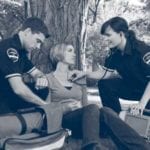
FREQUENTLY ASKED QUESTIONS




The requirements to become a CAC through IBCCES include training at least 80% of patient-facing staff in autism and sensory disorders through IBCCES. The process may also include an onsite review, as well as other support and guidance. The goal is to better prepare staff and management to treat/assist autistic individuals or those with sensory needs. The certification must be renewed every 2 years with updated training provided for staff at each certified organization.
IBCCES is an independent credentialing organization that was founded in 2001 with the goal to provide specialized training and certification to professionals working with individuals with autism and other cognitive disorders. IBCCES is a social impact company with the mission to provide training and certification to healthcare, corporate, education and travel professionals in order to improve the experiences and outcomes of individuals with autism and other disorders. IBCCES is a leader in the training and certification for cognitive disorders, including autism. We work in more than 80 countries across the globe.
- IBCCES works with an advisory board of clinical specialists with expertise in neurology, psychology, behavior therapy, special education, travel, and other disciplines, as well as individuals with autism. This advisory board is actively involved and participates in creating the training programs offered by IBCCES, which is evidence-based and promotes best practices from experts in multiple disciplines.
- IBCCES does not believe there is a “one size fits all” approach and thus brings together the expertise and learnings from multiple areas as well as the viewpoints and experiences of individuals on the spectrum.
IBCCES offers industry and position-specific training, as well as individual professional credentials. Depending on an individual’s position within an organization, their training may have a different focus; for example, clinical and administrative staff will typically complete different training tracks as appropriate to their level of interaction and professional licensure.
- The credentials and training are meant to supplement or build upon existing departmental and organizational regulations and rules, particularly in a safety or healthcare setting where professional protocols for patient or individual health and safety are already in existence.
- The IBCCES certification alone does not give individuals license to practice medicine (although some IBCCES credentials are approved for billing of therapy services in other states).
- All staff that complete training through IBCCES complete a competency exam specific to their training program to ensure comprehension.
The training and certification provided by IBCCES are specific to industry and position.
- For staff in settings such as hospitals, therapy clinics, residential programs, and other healthcare facilities receive more extensive training specific to autism, cognitive effects, co-occurring conditions, communication and behavioral strategies, as well as supporting research.
The purpose of the training and certification programs offered by IBCCES are to ultimately improve the experience and outcomes for autistic individuals and those with other related disorders.
- The focus is on building understanding and empathy, as well as improving processes and options for individuals with these needs, and ensuring staff have appropriate tools and strategies when engaging with a neurodiverse population.
- With 1 in 44 children diagnosed with autism (according to the Centers for Disease Control), along with millions of individuals who were never diagnosed but are on the spectrum, and 1 in 6 individuals having a sensory need or sensitivity, the need has never been greater.
